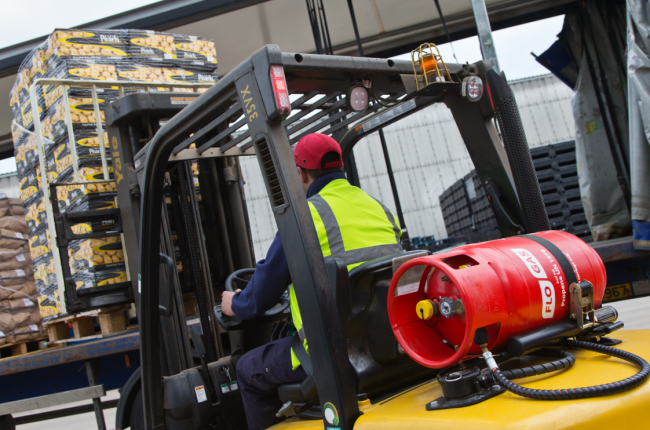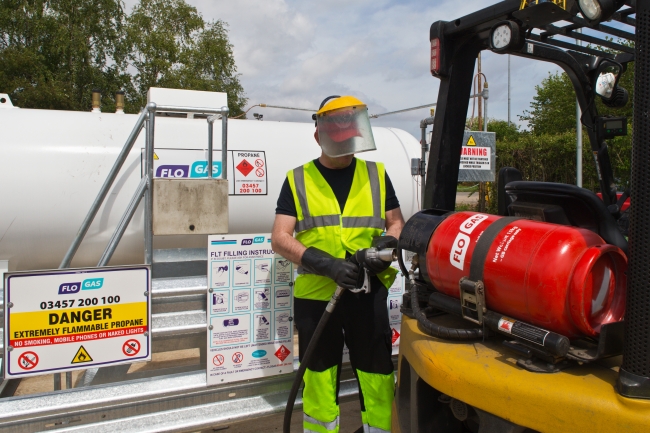4 minute read • published in partnership with Flogas
Insight: Lifting the bar with LPG – reasons to fuel forklifts with gas
In a demanding, 24/7 logistics-led world, a large percentage of forklifts (FLTs) are in use day and night, requiring them to be regularly maintained and constantly fueled. With so many of these vehicles consistently on the move, it is worth asking what type of fuel is driving them – and what implications it has in terms of cost, potential maintenance issues and, increasingly important, its environmental impact. Commercial gas supplier, Flogas Britain takes a look and discusses the options.
FLTs are indispensable tools that enable our modern-day lifestyles. Facilitating the easy movement and storage of a vast range of materials and products, they are vital pieces of equipment to help shift enormous loads across manufacturing plants, through warehouses, over construction sites and onto road haulage transportation.
According to BITA, the British Industrial Truck Association, in 2018 there was a 2.5% rise in the number of forklift trucks sold in the UK, which equates to more than 35,000 vehicles. These sales figures have more than doubled over the past decade, clearly demonstrating their growing importance.

The capital costs involved with fuelling LPG forklifts is drastically lower than those associated with electric ones as there is no infrastructure needed for recharging stations and no costly batteries / Picture: Flogas
The fuelling options
When it comes to fuelling FLTs, organisations have three main options: diesel, battery-powered (electric) and liquefied petroleum gas – otherwise known as LPG.
Traditionally, diesel has been a popular choice, mainly because of the reputation of diesel engines for a long life and reliability, as well as the lower diesel prices in previous years. However, compounds within diesel fuel are now recognised as harmful pollutants and there is increasing legislation requiring diesel fumes to be extensively treated.
The low-cost advantages as a cheaper fuel have also disappeared, with the recognition of diesel’s negative environment impact. Diesel is also susceptible to contamination from water, microbial infiltration, poor filtration, so requiring extra careful and regular maintenance.
Electric forklifts are significantly cleaner than diesel as they do not give off as many harmful emissions. They are also quieter than diesel versions and while they are typically more compact and manoeuvrable, they do have charging constraints. Whilst the cost comparison with diesel and LPG varies depending on usage, and varying fuel prices, the capital costs are substantially higher with electric. And, while spare batteries can be made available, this needs to be taken into consideration when looking at operational costs. Additionally, space needs to be found for the battery recharging station. Electric FLTs are also vulnerable to national grid power cuts in addition to potential circuitry and electric component issues in wet weather conditions.
All of which leads us to consider LPG. The capital costs involved with fuelling LPG forklifts is drastically lower than those associated with electric ones as there is no infrastructure needed for recharging stations and no costly batteries. And they get the added benefit of the extra space made available. LPG also allows for faster refuelling so avoiding unproductive downtime. In fact, Flogas customer QV Foods has found that refuelling its LPG cylinders can take as little as 30 seconds.
When it comes to power and flexibility, LPG powered trucks are clear frontrunners. In addition to having better power-to-weight ratios and more responsive engines, unlike diesel-powered trucks, they can be used inside as well as out. Electric-powered trucks also have their limitations, often unsuitable for prolonged periods outside or during inclement weather. LPG trucks have no such drawbacks, making them highly adaptable.

On-site bulk refilling stations are an excellent option for companies that require greater volumes of LPG for larger FLT fleets / Picture: Flogas
Contributing to a cleaner environment
Much cleaner burning than diesel, LPG releases far less CO2, harmful particulates and nitrogen oxides into the atmosphere, which contribute to respiratory problems and environmental issues such as acid rain. By switching to LPG, companies are able to position their operations to comply with increasingly stringent environmental legislation. Using LPG instead of diesel will also contribute to longer engine life and will avoid coating valuable products with diesel soot.
A case in point
Martin Ward, National Account Manager for Flogas Britain, commented that “the UK is leading the way towards a greener future. It makes sense for businesses to choose LPG forklifts over diesel or electric. We’ve seen so many businesses benefit from this move, and as with any innovation, those who move first get ahead of the competition in the long run.”
Choosing the right gas supplier can also be as important as the switch-over to LPG itself. This was true for Lincolnshire-based potato and vegetable production company, QV Foods, which operates 29 FLTs over a 40-acre site. Since switching its LPG supply to Flogas, the business has made substantial cost savings of 30%. This has allowed them to fund a brand new, centrally located gas hub – providing a convenient and safe refuelling station for its entire LPG FLT fleet.
On-site bulk refilling stations are an excellent option for companies that require greater volumes of LPG for larger FLT fleets. This is where a tank (or multiple tanks) are installed on their premises on a movable skid unit. Not only does this allow FLTs to be refilled as and when they need, but it can also be done quickly, easily and safely, without having to manually remove heavy cylinders off the back of trucks. At Flogas we’ll also remotely monitor a company’s usage, automatically arranging top-ups when low levels are detected.
